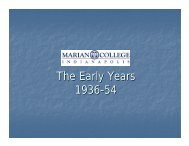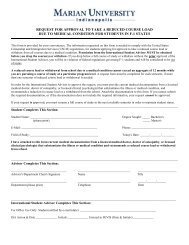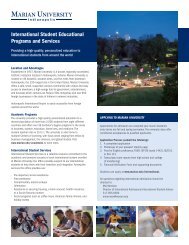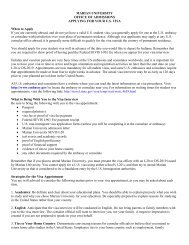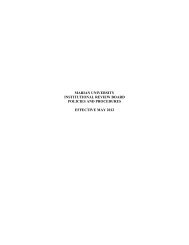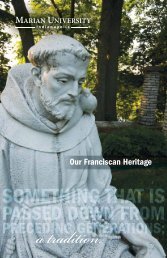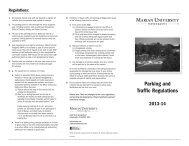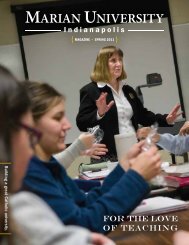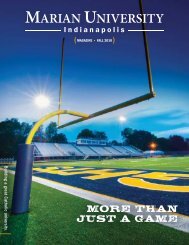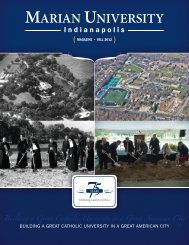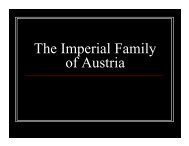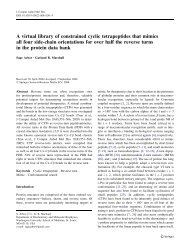2009-11 Marian University Course Catalog, fall 2010 edition
2009-11 Marian University Course Catalog, fall 2010 edition
2009-11 Marian University Course Catalog, fall 2010 edition
Create successful ePaper yourself
Turn your PDF publications into a flip-book with our unique Google optimized e-Paper software.
types of computer-assisted instruction can be implemented<br />
in the classroom. (SEM)<br />
EDU 130<br />
Introduction to Exceptional Children 3 credits<br />
This course includes definition, identification, prevalence,<br />
characteristics and educational needs of the various types of<br />
exceptional children. Information on the roles of the local<br />
school agency, the state, and the federal government as they<br />
pertain to the education of exceptional children is also<br />
learned. This is a lab course that includes visitations to the<br />
various school programs and private agencies serving children<br />
with special needs. (SPR)<br />
EDU 163<br />
Middle School Field Experience 1 credit<br />
Corequisites: 168, 263. Participation in a middle school<br />
setting. Class meets twice weekly through midterm to discuss<br />
the experiences and familiarize students with the profession.<br />
Students spend a minimum of 20 clock hours at the site. (SPR)<br />
EDU 164<br />
Diversity in High School 2 credits<br />
Class meets weekly to discuss the experiences and familiarize<br />
students with the challenges of meeting the needs of diverse<br />
learners as identified by race, cultural/ethnic heritage, and<br />
gender. Participation in a high school is required. Field<br />
participation occurs during the second half of the semester<br />
only. Students spend a minimum of 20 clock hours at the site<br />
in observing, teaching, and analyzing of how the needs of<br />
students in various racial, cultural, and gender groups are met<br />
in the high school classroom. (SEM)<br />
EDU 168<br />
Middle School Support Seminar 1 credit<br />
Corequisites: 163, 263. This course provides students<br />
opportunity to deepen their understanding of the culture of<br />
middle schools by investigating how teachers support the<br />
cognitive, social, physical, and moral development of early<br />
adolescents through collaboration with school<br />
administration, support staff, parents, and community<br />
agencies. Learning about the responsibilities of middle school<br />
teachers occurs through readings, lecture, discussion, and<br />
interviews with school personnel. (SPR)<br />
EDU 174<br />
Observation and Description<br />
of the Child 3 credits<br />
This course focuses on the variety of ways of observing,<br />
recording, and analyzing children’s development and<br />
behavior. Naturalistic observation is the primary area of<br />
study. The course requires students to work in a classroom<br />
one morning a week. (SEM)<br />
EDU 175<br />
Introduction to Schools and Society 3 credits<br />
This course focuses on the foundations of education including<br />
multicultural education and the diversity of students. Topics<br />
include the goals of schooling, the impact of schools, and the<br />
history of schools, particularly in the twentieth and twentyfirst<br />
centuries. Current trends and issues are also explored.<br />
The course requires students to work in various classrooms<br />
one morning per week. (SEM)<br />
EDU 221<br />
Expressive Arts 3 credits<br />
This course considers the expressive arts—visual arts, drama,<br />
dance and movement, music, technology, media, physical<br />
education, and health and nutrition—in relation to the<br />
Indiana Academic Standards, the NSAE Standards and the<br />
content areas of language arts, math, science, and social<br />
studies. Developmentally appropriate practices in arts<br />
methods and materials are presented and discussed with an<br />
emphasis on process rather than product. Assignments may<br />
include writing and presenting integrated activity plans that<br />
are developmentally appropriate, designing an arts and<br />
content-related bulletin board, observing and interviewing a<br />
“specials” teacher and attending an arts-related event. (SEM)<br />
EDU 230<br />
The Inclusive Classroom 3 credits<br />
The course addresses the needs of students with special<br />
needs in regular education classrooms at all levels. This<br />
course provides an overview of the range of abilities,<br />
appropriate observational skills, adaptation of curriculum,<br />
instruction, and assessment, and legal requirements. (SEM)<br />
EDU 233<br />
Assessment of Children<br />
with Exceptional Needs 3 credits<br />
Prerequisite: 130. This course examines the causes and types<br />
of learning problems found in children with exceptional<br />
needs. Students learn how the teacher can assess children<br />
with learning problems. Formal psychological evaluation tools<br />
are examined, and the value of the information to the<br />
classroom teacher is discussed. (FAL)<br />
EDU 263<br />
Middle School Environments 2 credits<br />
Corequisites: 163, 168. This course emphasizes knowledge of<br />
middle school structure and its purposes and the role of a<br />
teacher in the development of early adolescents and in the<br />
collegial collaboration needed to ensure strong learning<br />
environments for them. (SPR)<br />
EDU 314<br />
Teaching and Learning<br />
in Kindergarten 3 credits<br />
Prerequisite: Successful completion of Phase I. This course<br />
emphasizes theories of learning; personal, social, and moral<br />
development; individual and group differences; higher-level<br />
thinking; and motivation. Key concepts in kindergarten<br />
87



